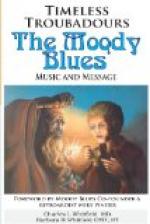Thus there was a service of love as there was a service of vassalage, and the lover stood to his lady in a position analogous to that of the vassal to his overlord. He attained this position only by stages; “there are four stages in love: the first is that of aspirant (fegnedor), the second that of suppliant (precador), the third that of recognised suitor (entendedor) and the fourth that of accepted lover (drut).” The lover was formally installed as such by the lady, took an oath of fidelity to her and received a kiss to seal it, a ring or some other personal possession. For practical purposes the contract merely implied that the lady was prepared to receive the troubadour’s homage in poetry and to be the subject of his song. As secrecy was a duty incumbent upon [16] the troubadour, he usually referred to the lady by a pseudonym (senhal); naturally, the lady’s reputation was increased if her attraction for a famous troubadour was known, and the senhal was no doubt an open secret at times. How far or how often the bounds of his formal and conventional relationship were transgressed is impossible to say; “en somme, assez immoral” is the judgment of Gaston Paris upon the society of the age, and is confirmed by expressions of desire occurring from time to time in various troubadours, which cannot be interpreted as the outcome of a merely conventional or “platonic” devotion. In the troubadour biographies the substratum of historical truth is so overlaid by fiction, that little reliable evidence upon the point can be drawn from this source.
However, transgression was probably exceptional. The idea of troubadour love was intellectual rather than emotional; love was an art, restricted, like poetry, by formal rules; the terms “love” and “poetry” were identified, and the fourteenth century treatise which summarises the principles of grammar and metre bore the title Leys d’Amors, the Laws of Love. The pathology of the emotion was studied; it was treated from a psychological standpoint and a technical vocabulary came into use, for which it is often impossible to find English equivalents. The first effect of love is to produce a mental exaltation, a desire to live [17] a life worthy of the beloved lady and redounding to her praise, an inspiring stimulus known as joi or joi d’amor (amor in Provencal is usually feminine).[7] Other virtues are produced by the influence of this affection: the lover must have valor, that is, he must be worthy of his lady; this worth implies the possession of cortesia, pleasure in the pleasure of another and the desire to please; this quality is acquired by the observance of mesura, wisdom and self-restraint in word and deed.




